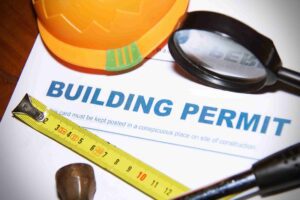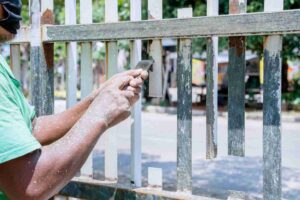Is It Cheaper to Build Your Own Fence?
With years of experience in the home improvement industry, we often receive a common question from our customers, “is it cheaper to build your own fence or not?” After examining the potential savings and essential factors to consider when you build it yourself, we’ll show you a complete picture of what to expect versus hiring a professional to get the job done.
Is It Cheaper to Install a Fence Yourself?
You can save more money if you decide to install a fence yourself. If you have the required carpentry skills for your DIY project it will be cheaper because you’ll only be paying for the materials. However, if you don’t have the proper tools, the costs can quickly exceed what’s reasonable.
While the labor might seem free you could end up paying for it in the long run if you’re not careful with your install and how you treat your body. For those new to DIY projects, it’s important to know that you may encounter several setbacks and challenges throughout the process.
How to Save More Money When You Install Your Own Fence
Here are some practical insights that can help reduce costs effectively:
- Choosing your Wood Type – For the type of wood fence, don’t choose expensive ones like redwood. Go for composite wood or pressure treated pine. It’s cheap, but also very durable.
- Lowering the Fence Height – The length of the pickets you install will increase your budget. Longer pickets, require more material, and are more expensive. We recommend only going a low as 6 foot pickets. If you go lower than that, it won’t help in terms of privacy.
- Choose a Manual Gate – Choosing a manual rather than an automated gate is more practical. Manual gates come with a lower price tag and offer a straightforward solution for your fence.
- Renting Tools – If you don’t have the necessary tools for your fencing project, you can save by renting rather than buying expensive tools.
How Much Does It Cost to Hire a Professional to Install Your Fence?
Assuming you hire professional help, the expected average rate typically hovers around $40 per hour. However, this cost can vary between $35 and $70 per hour, depending on your location. Alternatively, you can calculate the cost per linear foot, with an average of about $10 but with potential fluctuations ranging from $5 to $14 per linear foot.
Factors that Influence the Cost of Fence Installation
Whether you decide to build your own fence or hire a fencing company, we’ve outlined the factors that influence the cost of fence installation here:
- Landscaping: Integrating landscaping into your project comes with added costs. Whether you envision stunning bushes and flowers to complement your fence or you need to remove a tree, your landscaping costs can be a significant size of your budget.
- Material: Your choice of materials significantly impacts the cost of your fence. Typically, aluminum, metal, or vinyl options are more expensive than wood.
- Lighting fixtures: Adding outdoor security lights to your fence project enhances safety but at a higher cost.
- Type of Gate: Selecting between a manual gate and an electric gate will change your budget. Manual gates typically do the job of security, but electric gates offer the convenience of remote access control, bolstering your home’s safety and accessibility.
- Permits: Check whether permits are necessary for fence installation in your area. While permitting is typically part of the development process, some regions may not impose fees for fence construction.
- Size of Your Yard: Naturally, Installing a fence around a larger yard will cost more due to increased materials and labor.
- Slope of Yard: Fencing on a sloped yard requires more labor and may increase expenses to ensure alignment with the terrain.
- Labor: The labor cost for fence installers varies by region and depends on the cost of living. Labor rates can be hourly or per project, so it is essential to understand local rates for budgeting purposes.
- Fence Height: When building a fence, choosing a height higher than the standard six feet for increased privacy will require more materials and labor, leading to higher costs.
- Removing an Existing Fence: If you plan to replace an old fence with a new one, it’s essential to consider that the cost will increase, as the existing structure needs to be removed first. Disassembling the old fence is a crucial step that adds to the overall project expenses.
Tips on How to Save More Money When You Hire Professionals
Hiring a professional to do your fencing requirements can save time and obviously requires less physical effort from the homeowner. Here are some tips to save more money if you leave it to the pros:
- Compare and Survey Quotations – Don’t just accept the first offer immediately. Find the best contractor that fits your needs.
- Schedule It During Off Season – In our previous blog post, we highlighted how labor costs decrease during winter due to low demand. Take this as an advantage to save more on costs.
- Check for Special Deals or Promotions – Look for any special deals or promotions offered by professionals in your area. These could include seasonal discounts or package deals.
- Think of the Long-Term Life of the Fence – Consider that you are buying a fence that should like upwards of 25 years. Going with the cheapest contractor can hurt you if the fence they install only lasts 10 years or less. Make sure you’re selecting someone who does quality work.
See also our blog post on if it’s cheaper to repair or replace a fence.
Is It Easy to Install a Fence Yourself?
Fence installation is a labor-intensive task that inexperienced individuals may struggle with. Mistakes could result in financial setbacks and voided material warranties. If you want to leave it to the experts, get your free estimate from Top Rail Fence.
Here’s an outline of the pros and cons of installing a fence yourself:
Pros:
- Save on Labor Costs – Opting for DIY fence installation primarily delivers cost savings in the form of labor, sidestepping the expenses of hiring professional installers.
- Customization: DIY fence projects grant you complete control over design, materials, and project timelines, allowing for tailored solutions that match your preferences and requirements.
- Learning Experience – Engaging in DIY fence installation provides a valuable learning opportunity, enabling the acquisition of new skills and a sense of accomplishment upon project completion.
Cons:
- Time-Consuming – DIY fence installation can be time-consuming, especially for those without experience, potentially leading to project delays compared to professional services.
- Limited Skills – The installation process demands specific construction skills and knowledge, and inexperienced individuals may make errors that compromise the fence’s structural integrity.
- Requires Physical Labor – Fence installation is physically demanding work involving tasks like hole digging and heavy lifting, which can be challenging for some DIYers.
- Compromises Quality and Durability – Without professional expertise, the quality and durability of your fence may suffer, potentially resulting in issues like sagging, uprooted posts, unevenness, or premature wear and tear.
- Needs Specific or Specialized Tools – Specific tools and equipment, such as post hole diggers and saws, are required for the installation, adding to the overall cost and potential project delays.
- Risk of Error – Errors made during installation may affect the warranty on your fence materials, potentially resulting in reduced coverage compared to professional installations.
Conclusion
To sum up, choosing between a DIY fence installation and hiring professionals involves carefully considering cost factors and personal preferences. Each option presents distinct advantages and drawbacks.
DIY projects offer cost savings, customization, and a valuable learning experience but come with the trade-off of time-consuming tasks, potential errors, and the need for specific tools.
On the contrary, selecting the right professional can provide efficiency, expertise, and guaranteed quality, although at a higher expense. We recommend that you consider your budget, time constraints, and willingness to engage in hands-on work for your fencing project.


